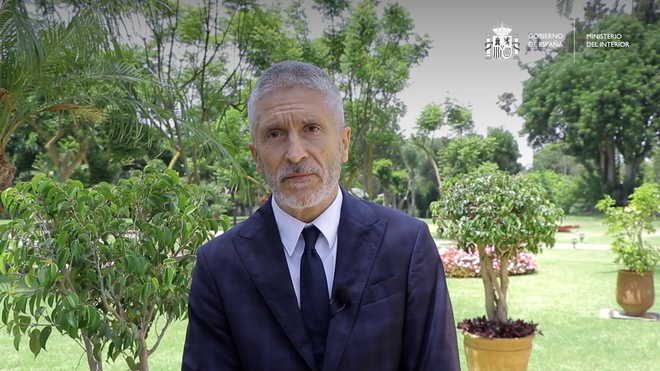Fernando Grande-Marlaska has staged today with his Moroccan counterpart the new Madrid-Rabat relationship with the tragedy of the Melilla fence still hot and under investigation by the Prosecutor’s Office.
In the meeting -particularly delicate (the attempted assault two weeks ago left more than 20 sub-Saharan people dead in the Moroccan part) and in which the Commissioner for the Interior of the European Union, Ylva Johansson, was present-, the commitment was sealed to strengthen collaboration between the police forces of both countries.
This point is extremely important after years of disconnection between the agents of the two Bodies due to Spain’s position in the Sahara conflict. The lukewarmness in relations has caused severe assaults on the fence in both Ceuta and Melilla due to the relaxation of the Moroccan gendarmes in their custody.
The most virulent and evident was the one that was registered last year when the Government of Pedro Sánchez welcomed the leader of the Polisario Front, Brahim Ghali, in Spain to deal with the serious coronavirus that he suffered from. Morocco let thousands of people pass into Ceuta without being prevented by its police.
From now on, according to ministerial sources, there will be joint investigations and work will be done in absolute cooperation. In addition, the strategy outlined to deal with the new methods used by the organizations that ‘help’ immigrants to reach the border with Spain involves support for border management and the strengthening of cooperation with Union agencies European, indicate the same sources.
The commissioner and the two ministers have expressed regret for the “painful events” that took place on June 24, as well as the injured, including members of the Security Forces.
“These events, in addition to constituting a human tragedy, put to the test the traditional devices for combating human trafficking and demonstrate the extreme danger of human trafficking networks and the risks they are willing to generate,” they pointed out.
They have also highlighted the investigations that are being carried out to clarify the circumstances of these events.
“In the area of migration, Spain works decisively in cooperation with the countries of origin and transit and in the fight against the mafias that traffic in people, both through the exchange of operational information and through joint actions,” they added from the Ministry of the Interior.
According to his calculations, the mechanisms established in these areas allow 40% of irregular migratory movements to be stopped at origin.
The European Commission is also working, within the framework of the new migration and asylum pact, on setting up cooperation mechanisms on migration matters with the countries of origin and transit.
Conforms to The Trust Project criteria
















